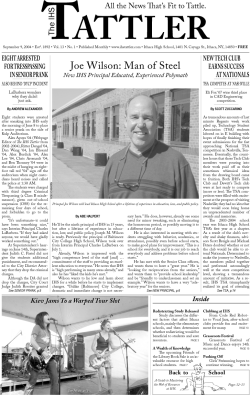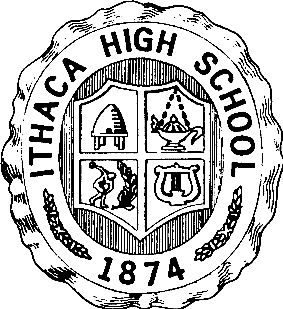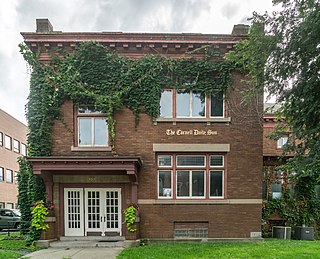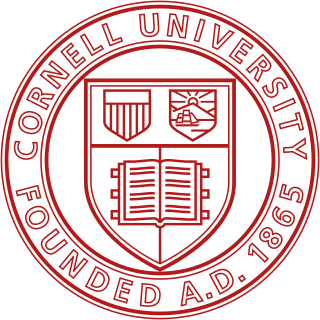
Ithaca College is a private college in Ithaca, New York. It was founded by William Egbert in 1892 as a conservatory of music and is set against the backdrop of the city of Ithaca, outside Cayuga Lake, waterfalls, and gorges.

The Tattler is the student newspaper of Ithaca High School in Ithaca, New York. Founded in 1892, it is one of the oldest student newspapers in the United States. It is published twelve times a year and has a circulation of about 3,000, with distribution in both the school and in the community.

The Cornell Review is an independent newspaper published by students of Cornell University in Ithaca, New York. With the motto, "We Do Not Apologize," the Review has a history in conservative journalism and was once one of the leading college conservative publications in the United States. While the ideological makeup of its staff shifts over the years, the paper has consistently accused Cornell of adhering to left-wing politics and political correctness, delivered with a signature anti-establishment tone.

The Maneater is the official, editorially independent student news publication of the University of Missouri. The Maneater editorial and advertising staffs are composed entirely of students, with the exception of a professional business adviser. Financially, The Maneater is a non-profit publication funded by advertisers. The newspaper is distributed free of charge, and all aspects of its website remain accessible at no cost to readers. The editorial department of The Maneater remains independent from any student governments and organizations, as well as the Missouri School of Journalism and university itself.
The Orion is the student newspaper of California State University, Chico and produces 32 issues every year, 16 each semester. Its offices are in the basement of Plumas Hall on the Chico State campus. It has won numerous state and national awards, including several National Pacemakers. Its name is taken from the constellation Orion, as the newspaper is meant to be a "hunter of truth."

The Samuel Curtis Johnson Graduate School of Management is the graduate business school in the SC Johnson College of Business at Cornell University, a private Ivy League university located in Ithaca, New York. It was founded in 1946 and renamed in 1984 after Samuel Curtis Johnson, founder of S.C. Johnson & Son, following his family's $20 million endowment gift to the school in his honor—at the time, the largest gift to any business school in the world.

The Nolan School of Hotel Administration at Cornell University is a specialized business school in the SC Johnson College of Business at Cornell University, a private Ivy League university located in Ithaca, New York. Founded in 1922, it was the world's first four-year intercollegiate school devoted to hospitality management.

The Hoya, founded in 1920, is the oldest and largest student newspaper of Georgetown University in Washington, D.C., serving as the university’s newspaper of record. The Hoya is a student-run paper that prints every Friday and publishes online daily throughout the year, with a print circulation of 4,000 during the academic year. The newspaper has four main editorial sections: News, Opinion, Science, Sports and The Guide, a weekly arts and lifestyle magazine. It also publishes several annual special issues including a New Student Guide, a basketball preview and a semesterly fashion issue.

Ithaca High School (IHS) is a public high school in Ithaca, New York, USA. It is part of the Ithaca City School District, and has an enrollment of approximately 1,675. The school is located at 1401 North Cayuga Street in the north end of Ithaca, near Stewart Park, Cayuga Lake, and Ithaca Falls. The current principal is Jason Trumble.

Washington Square News (WSN) is the weekly student newspaper of New York University (NYU). It has a circulation of 10,000 and an estimated 55,000 online readers. It is published in print on Monday, in addition to online publication Tuesday through Friday during the fall and spring semesters, with additional issues published in the summer. It serves the NYU, Greenwich Village, and East Village communities in Manhattan, New York City.

The Cornell Daily Sun is an independent newspaper published three times a week in Ithaca, New York, by students at Cornell University and hired employees. Founded in 1880, The Sun is the oldest continuously independent college daily in the United States.
The State Press is the independent, student-operated news publication of Arizona State University. In August 2014, it became an all-digital publication. It published a free newspaper every weekday until January 2013, at which point its print distribution was reduced to once per week. The editorial board announced that ASU Student Media will begin to focus on "a host of new digital products and special print products."
The California Pelican was a college humor magazine founded in 1903 by Earle C. Anthony at the University of California, Berkeley. Lasting eighty years, it was the first successful student humor magazine in UC Berkeley, though it was preceded by Smiles in 1891 and Josh in 1895. It is succeeded by the Heuristic Squelch, which is still running.

The Indiana Daily Student (IDS) is an independent, student-run newspaper that has been published for the community of Indiana University in Bloomington, Indiana, since 1867. The IDS is free and distributed throughout the campus and city.

Ithaca College Television (ICTV) is Ithaca College's student-run television station. It's the largest student-run organization on Ithaca's campus. Founded in 1958 as the country's first student-run cable television station, ICTV provides original, student-produced programming to approximately 26,000 households in Tompkins County, New York through Spectrum Cable. Additionally, ICTV offers a livestream of its programming on its website, ICTV.org, along with on-demand episodes from past and present shows.

The Roy H. Park School of Communications is one of five schools at Ithaca College, in Ithaca, New York, United States. The school is named after media executive Roy H. Park, who lived in Ithaca and who served on the board of trustees at Ithaca College for many years.

Cornell University is a private Ivy League land-grant research university based in Ithaca, New York. The university was founded in 1865 by Ezra Cornell and Andrew Dickson White. Since its founding, Cornell has been a co-educational and non-sectarian institution. As of fall 2022, the student body included over 15,000 undergraduate and 7,000 graduate students from all 50 U.S. states and 130 countries.
Generation is a student publication that operated out of the State University of New York at Buffalo in Buffalo, New York. Founded in 1984 by Eric Francis Coppolino, at first it was it was a fortnightly magazine with wide-ranging news, arts, literary and sports features concerning both campus and community events and issues. It later became a weekly magazine. Before September 2009, Generation Magazine was a weekly magazine predominantly featuring news, multimedia review, and literary articles.
The Cornell Lunatic is the college humor magazine at Cornell University, founded on April 1, 1978, by Joey Green.

Parnassus is the annual literary arts magazine of Northern Essex Community College in Haverhill, Massachusetts. The magazine has been in publication since 1965, and was a bi-annual publication until 2008, when it switched to a yearly publication, with issues released at the end of each year's spring semester in May. Parnassus is a free publication, and copies can be found at the Haverhill campus of NECC while available.















